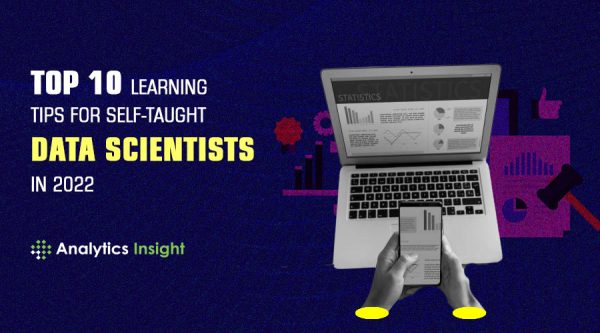In this article, we gave the top 10 learning tips for self-taught data scientists in 2022
Data science is an essential part of many industries today, in the field of study that combines domain expertise, programming skills, and knowledge of mathematics and statistics to extract meaningful insights from data. Data scientists examine which questions need answering and where to find the related data. Its popularity has grown over the years, and companies have started implementing data science techniques to grow their business and increase customer satisfaction. In this modern age of information technology, an enormous chances are available to learn data science for self-study to become data scientists, can master the fundamentals of data science. Here we gave the learning tips for self-taught data scientists.
Learn The Tools: There are many tools that data scientists can use to process, analyze, and visualize data. SAS, Apache Spark or simply Spark, BigML, Github, Jupyter notebooks, TensorFlow, D3.js, MATLAB, Excel, ggplot2, Tableau, Jupyter, Matplotlib, Natural Language Processing, Scikit-learn, TensorFlow these are the some of the tools can be overwhelming to learn to become a data scientist.
Level Up Your Soft Skills: Making a career in data science is just as much about people skills as it is technical. In the process of product development, improving customer retention, or mining through data to find new business opportunities, organizations are increasingly relying on data scientist skills to sustain, grow, and stay one step ahead of the competition.
Signing Up for Hackathons: Hackathons are events where you work on a project with other people. It helps to learn how to put all new data science knowledge into practice as well as meet like-minded individuals who were also interested in learning more about data science or had already learned quite a bit.
Learning from Textbooks: Learning from textbooks provides a more refined and in-depth knowledge beyond what you get from online courses. These books provide a great introduction to data science and machine learning, with code including Python Machine Learning.
Practice The Fundamentals: The data science method looks similar to the scientific method, but with the heaviest emphasis on ensuring that all the data used is of the highest quality. Data wrangling comprises the bulk of data science because, without quality data, your insights are meaningless, or worse, incorrect.
Online courses: These online courses really help to learn the fundamentals of data science and how to apply them. It was able to see what other people were working on, and how they approached problems.
Dive into the Technical: One area where traditional learning can be beneficial is in the technical aspects of data science. The field has underlying mathematical concepts that separate data scientists from data hobbyists. Regression analysis, Probability, Statistics, Linear algebra, etc are some of the essential concepts for budding data scientists.
Delve into More Advanced Topics: Becoming a well-rounded data scientist involves taking your foundational data science skills beyond simple data analysis. LM, DL, NLP, and Neural networks are the advanced topics that can provide inspiration for data science specialization.
Doing personal projects: Doing personal projects to help build up a portfolio. This also helps to learn more about real-world problems as well as how people approach which is something don’t get from online courses.
Pick Up a Programming Language: Without learning the programming language, one cannot become a data scientist. Data scientists build algorithms and environments to run those algorithms. Python, R-programming, and Context-specific language are some of the popular programming languages for data science.
Source: analyticsinsight.net









